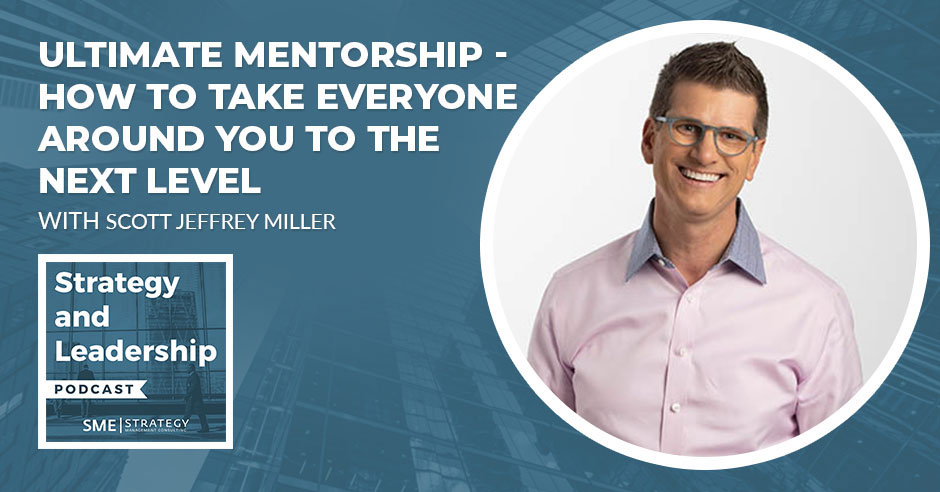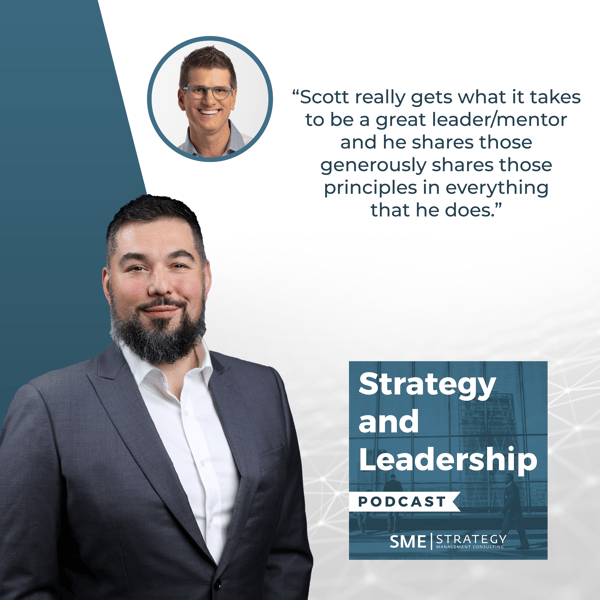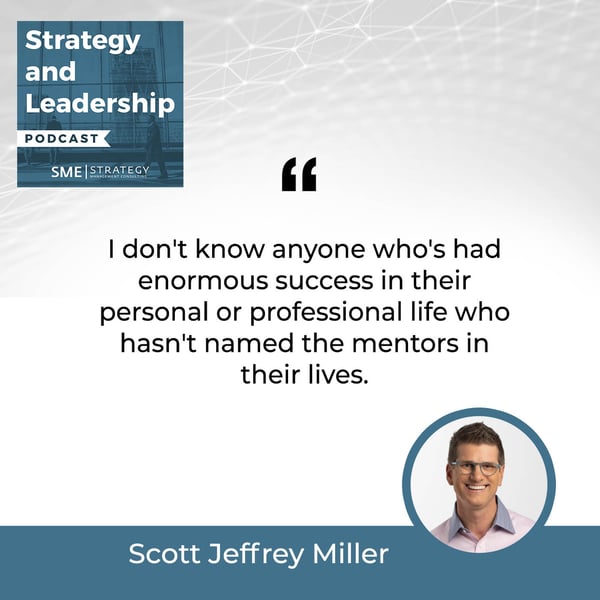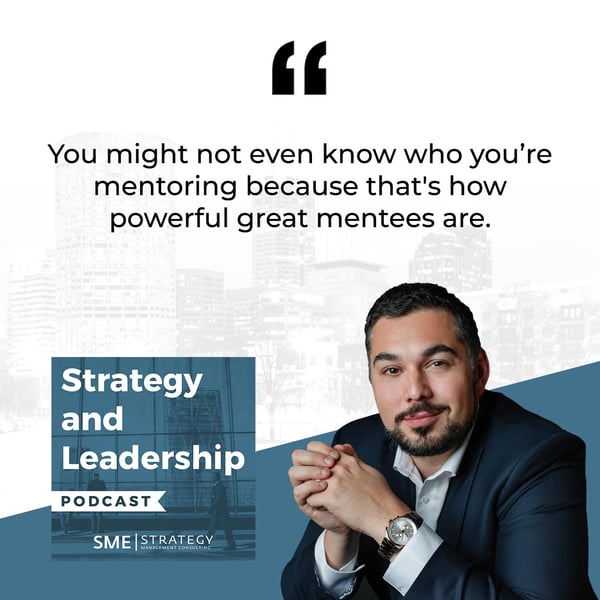Ultimate Mentorship - How To Take Everyone Around You To The Next Level With Scott Jeffrey Miller

Are you a leader looking to make a lasting impact? In this episode, we dive into the world of mentorship with Scott Jeffrey Miller, author of The Ultimate Guide to Great Mentorship. Discover the distinct roles of leadership and mentorship, the evolving landscape of leadership in a post-COVID world, and the invaluable insights that mentors and mentees can gain from each other. Join us for a thought-provoking discussion that will change how you view mentorship and leadership. Tune in and start your journey towards becoming an influential mentor or finding the right mentor for your growth. Don't miss this engaging conversation that reveals the power of mentorship in transforming lives and careers. Stay tuned!
Listen on Spotify: https://open.spotify.com/episode/3nkJ3b7Vr0waaL6c4f4nLm?si=518b0f2657644af5
Listen on Apple Podcasts: https://podcasts.apple.com/ca/podcast/ultimate-mentorship-how-to-take-everyone-around-you/id1202449526?i=1000628743236
---
Watch the episode here
Listen to the podcast here
Ultimate Mentorship - How To Take Everyone Around You To The Next Level With Scott Jeffrey Miller
In this episode, my guest is Scott Jeffrey Miller. He has quite the resume. He is a Wall Street Journal bestselling author. He is the host of the world's largest leadership podcast and the author of his sixth book, The Ultimate Guide To Great Mentorship. Scott Jeffrey Miller, how are you?
I'm awesome. Thanks for the platform and for the spotlight. I’m excited to talk about mentorship with you.
I am so stoked. One of the things that we haven't even talked about was your 27 years at FranklinCovey, which is another whole thing that blows my mind because you've touched on such cool areas in addition to many other cool things. Why don't you tell our audience a little bit about who you are and what psychs you up in the morning, and then we'll get into it.
What psychs me up in the morning is getting my kids off to school. I live in Salt Lake City, Utah with my wife Stephanie. We have three young sons who are 8, 11, and 13. I'm from Florida, originally. I worked for the Walt Disney Company for four years until they invited me to leave. Where does a single Catholic boy from Orlando, Florida move to? To Provo, Utah back in 1996 where all the Catholics were.
There wasn't a single Catholic in Provo, Utah 27 years ago, but Dr. Stephen Covey, the author of the seminal book, The 7 Habits Of Highly Effective People, hired me and brought me out to Utah where I spent 27 years and worked from the frontline to the C-Suite. I became the chief marketing officer and executive vice president of what is now the world's most influential and trusted leadership development firm. I was the CMO for 10 years, 3 times the national average for a public CMO.

I retired from the firm in good standing about three years ago. I still am an ambassador for the company. I host the world's largest weekly leadership podcast called On Leadership with Scott Miller. I've authored six books. I have a little bit of expertise in leadership, management, careers, and culture. I'm excited to talk about mentorship.
In the time that you've been doing this, you see a lot of people and you talk to a lot of people. How would you characterize the evolution of leadership? I'm going to ask you about how mentorship fits in in that. At the time that you've been talking and writing about it, could you take some snapshots in terms of how it has evolved from your perspective?
Leadership probably is unrecognizable now from even pre-COVID, not to mention 10 to 20 years ago. There are a couple of evolutions that I would illustrate. One is not everyone should be a leader of people. Too many organizations reserve the promotion and increase in influence and compensation to those who are leaders. Too often organizations lure people into leadership. What happens in most companies is you promote the top individual producer or the most efficient dental hygienist to run the office, or the most creative digital designer to be the director of the creative division, or the top salesperson to become the sales leader.
There's no correlation between being a sales producer and a sales leader. In fact, those skills are often inversely correlated. Not everyone should be a commercial airline pilot. Not everyone should be an anesthesiologist, and not everyone should be a leader of people. You should be very deliberate about this. Does this tap into what you truly want to do with your career, or is it the only way to get a promotion? Let that rest with some gravity on your audience. Leadership is not the right track for everyone. It was like, “I'm never going to be an oral surgeon. I'm not sure I should have been a leader of people. I was the top individual sales contributor. It was the only way to earn more money and move my way up into influence in the company.”
Secondly, post-COVID, everyone needs individualized leadership. People have different passions and traumas. People have different talents, skills, and dramas. Now everyone is bringing their whole lives to work and they need a leader that can lead them effectively individually. It was common in years past when Anthony had a leadership style and everybody needed to align to it or cleave to it. That doesn't work anymore.
Everyone needs individualized leadership. People need a leader who can lead them effectively individually.
You now have to lead the way all of your people want to be led. That might be fifteen different leadership styles. There are principles that govern human behavior. Those are common to all cultures, religions, companies, industries, and countries. Beyond those principles of leadership, you know how to treat people. Don't gossip, keep confidence, listen more than you speak, check-in, pay attention, and show empathy. Those are principles of being a good human. Now leaders need to bring a level of engagement that wasn't even required of them before COVID.
One of the things that struck me, and I hadn't heard about it before but I believe it to be true, is the one-size-fits-all leadership, "You follow me," and this brute force. As I look at market forces, generally speaking, the increased individualization of everything, you have your own ability and your own rights. That sounded like the dumbest thing I've almost ever said.
Brand website approach.
It’s like, "I've got my customized new suite. I've got all of these things." Now people have their expectations and opportunities truly because of how the world has evolved for them to meet their respective needs. As leaders, for them to continue to be successful, it's the expectation of the consumer, in this case, the employee. You need to be able to match that up. Segueing into my second question from before was what's the difference between leadership, “I'm telling you all,” and mentorship, “I'm supporting you on a one-on-one basis.” It's an important distinction. How do you view the distinction between leadership and mentorship?
They have very little in common. I honestly think that just because you're a great leader does not mean you're a great mentor. Most mentors are probably leaders by the sheer nature of their longevity, wisdom, tenure, and experience. I'm often asked in podcast interviews to talk about reverse mentorship. I say, “There's no such thing.” Mentorship is mentorship, age-agnostic. It's about helping someone guide them toward what they want to accomplish following the thirteen roles that I talk about in my book.
To your point, great leaders can be great mentors, but there isn't a one-to-one correlation. When I think of a leader, I think of lots of talents, including someone who's typically quite decisive, someone who probably accelerates and processes information fairly fast. Someone who is in persuasion mode, influence mode, and selling mode, not all the time. Someone who can peel the onion and get to the root cause in a very quick fashion. Those can be great leadership skills.
Those typically aren't great mentorship skills. If you believe that your job as a mentor is to help your mentee progress what is her or his goal, then you have to often exercise an unnatural level of patience. It may have nothing to do with your journey. It may not be your goal. They likely have a different personality and experience than you do. That could be said for great leaders, but when I think of a leader who's running an organization, they usually have a bias to action. They have empathy. They need patience, but they also have goals that have to be accomplished regardless.
It's important to differentiate between mentors, leaders, coaches, allies, champions, and supporters. Those are different. Mentors are not always your leader. In fact, rarely should your leader be your mentor. It happens sometimes, but rarely. I don't think mentorship is about being your ally, supporter, or champion. Your mentee might earn through their demonstration of making and keeping commitments, being trustworthy, and showing growth. They might earn you into becoming their ally, but that's not the role you start out as a mentor.
Mentors are not always your leader. In fact, rarely should your leader be your mentor.
As I think about your journey and you said, “CMO, three times longer than the national average,” what was one of the lessons you learned potentially the hard way about being a leader or a mentor in your own personal journey?”
Everything I've learned is the hard way. Trust me, I've never learned anything the easy way in life, starting with Algebra, which I never learned. I kept failing it and being under restrictions from my parents, but that’s for a different episode. I've learned a lot in my day. Obviously, being tutored by some of the biggest names in the business. The biggest learning I had was from the CEO, who probably is my mentor, not formally but informally. As the chief marketing officer of the FranklinCovey Company, I was a member of the executive team and reported to the CEO. He’s a man of impeccable integrity, Harvard MBA, super handsome, trustworthy, and competent. He has climbed the Matterhorn and has done the Ironman 30 times.
We have nothing in common. He's very deliberate, patient, and focused. I'm very impatient and impetuous. One day after an executive team meeting, we break and he walks past me on the way to the restroom. I say “restroom” because he probably needed a break. He walked past me and said, “Scott, you make too many declarative statements,” and he left his office. That was his way of both having an intervention and probably avoiding conflict, and not wanting me to ask him ten questions.
It was a powerful statement because what he was saying is, “Scott, you can be a jackass. You're always the first to answer the questions. You're always first to weigh in. You're always right. You have an opinion on everything. You never ask any questions. You always state facts that are often your opinions. Stop conflating your experiences, emotions, and opinions with facts.” What he said was, “Scott, you make too many declarative statements.” It was a watershed experience for me. I didn't need to ask him to unpack that. I knew.
Stop conflating your experiences, emotions and opinions with facts.
It fundamentally changed my ratio of listening to speaking. It changed my style of conflating my opinions and presenting them as facts. It stopped me from always raising my hand to be the first one to weigh in on initiative, strategy, or a vote. I became a little more patient in listening to the wisdom and positions of others. If I still vehemently disagreed with them, I weighed in as the seventh person, not always the first.
The powerful thirteen words, and you don't need to say more. It sounds like both a tremendous respect. I think he respected a lot of you because I don't think he would've said something like that. I think that from the folks that I see, especially young leaders. When I say young, I don't necessarily mean they're not of age. It means that they don't have the experience. It can be confronting to be able to deliver such a profound, impactful, and helpful statement for fear of conflict.
One of his personality traits is he doesn't like conflict. Back him into a corner and you will lose. Do not back him into a corner. I had also done something that you're alluding to, which was he knew I could handle it. We had developed a trust and rapport where he could right-size me, to quote you in 12 or 13 words, without me losing my self-esteem, punishing him, or taking my toys metaphorically and going home.
I had set the conditions where he knew I could take it because he didn't speak that way to other people. He said it in a very respectful way. This guy is my hero. I love this man. I would give him a kidney tomorrow. We have very little in common. He's driven me crazy. I can assure you I've driven him crazy, but we have a healthy respect for each other. He knew I could handle it, which is why he said it straight talk to me.
If we look at our audience who may be those experienced or not-experienced leaders who are mentally trying to grapple with your original statement, leadership and mentorship have very little to do with each other. They are distinct skills and experiences. If they want to evolve on the path of being better mentors for their people, providing an individualized experience versus a group take-it or leave-it experience, what are 2 or 3 practices they could take in place, or 2 or 3 considerations they should embody as they move either in terms of summer reflection while they pick up your book and read it thoroughly cover to cover, or bring it into their next team meeting?
The book is called The Ultimate Guide To Great Mentorship: 13 Roles To Making True Impact. Role number 1 is the revealer. As the revealer, you recognize your job is to help your mentee accomplish their goal. They come to the mentor session and say, “I'm thinking about being a patent attorney or an orthopedic surgeon.” “Those are different paths, let's talk about those.”
Your job is to uncover so that they can discover, which requires you to probably flip the number of percentages you spend speaking versus listening. As in 80/20, as a leader, you probably talk 80% of the time and listen 20% of the time statistically. The mentor, I think you flip those and you listen 80% and speak 20%. The second component of the first role is to become hyper-aware of what it's like to be in a mentoring session with you.
What's it like to be on the receiving end of feedback from you? What's it like to be led by you? What's your voice inflection, rate, tone, pitch, energy, and hand gestures? What's your physical energy like? How intimidating is it to be in a conversation with someone of your level of success, wealth, education, or title? Don't underestimate how intimidating your vocabulary and word choice can be.
Secondly, don't ever break the golden rule of mentorship, which is never to say, " Anthony, if I were you, I would do this.” You're not them. You don't have Anthony's talents and fears. You have your own. Do not live vicariously through your mentee. Do not try to accomplish the things you wished you could have or would have through your mentee.
You instead say, “Once when I was faced with a similar opportunity, here's how I worked through it. That may or may not be relevant to how you should work through it. Let's talk about how I worked through it. If there's anything to tease out of that for you, let's delve into that, but let's talk more about how you should approach it. What is the upside and downside? What are the strengths and weaknesses of how you might approach it?” That's super important.
Most of all, it's also valuable that as a mentor and a leader you set boundaries. Role number 2 is the boundary setter. You have an uncomfortable conversation upfront to say, “I’m looking forward to this mentoring opportunity. Let's talk uncomfortably for three minutes. Here are some things that I don't intend to play as your mentor. I'm not your best friend. I'm not your ally or champion. I'm not your private equity funder. I'm not your Rolodex. Please don't ever put me in a situation that might ask me to do those things because that will be embarrassing.”
If you're a leader and you are a mentor, those things might cross because as a leader, you probably should be the champion, an ally, and a reference point for your mentee. They often have different roles. I generally advise people not to ask their leader to also be their mentor. It can happen but it's usually rare.
A question popped into my mind. Have you ever experienced people who say, “Which am I? Am I a leader or a mentor? Am I both? How do I make that distinction? Is it a choice?”
I want to clarify because if I were to go back and name my fifteen leaders in life, I'd bet to some extent they were all mentoring me. That does not mean that I designated them as my mentor or that I walked up to them and said, “Would you mentor me once a month for the next nine months on a topic of how I get into law school or how I become a vice president?" That can happen. My recommendation is that you don't have your leader become your mentor. They naturally might play that role informally for you, but I'd argue that you keep that a little bit separate. No doubt I've been mentored by all of my leaders informally.
Let me clarify the definition of mentorship. I think it's how you define it. My greatest mentor in life is a guy I never met and he never met me. He's a guy named Bruce Williams who hosted a very popular financial business radio talk show back in the ‘80s. I listened to it every night. It was called the Bruce Williams Show. I learned how to read a P&L on the radio while lying in bed as a junior high school student. I learned about how to buy a home and mortgage insurance, when to use an attorney, and how to invest in inheritance. Nerd alert, I know. Bruce Williams died having no idea Scott Miller was even alive and someday is going to write a book called The Ultimate Guide To Great Mentorship, and talk about him on your show.
Redefine what mentorship looks like for you. It may well not be your leader. It might be your leader that is a previous leader. You go back to her or him and say, “Would you mentor me now?” I think it puts your mentor in a difficult position to separate those roles of both firing you and mentoring you, or of promoting you and mentoring you. Be careful about putting your mentor into an uncomfortable position that she or he may not want to be in.
That's well said. That’s so much to learn and to think about. Any final piece of advice for our audience as they evolve in their leadership, mentorship, and as they are being mentored themselves as they look at growing and evolving in their career, and then we'll finish up.
You should be both. I don't know anyone who had enormous success in their personal life or professional life that hasn't named the mentors in their life. Sometimes formally. Sometimes informally. My call to action would be to make sure you always have a formal mentor. That means you've asked them, “Anthony, I'm trying to increase my influence and my reputation. I admire how you've built yours. Could you mentor me 3 or 4 times for 45 minutes over the next 3 or 4 months on things I could do to build my credibility and my influence inside this company?”

Notice I set some parameters. I said 3 or 4 times once a month, and then stick to those. Always have a mentor. At the same time, you are a mentee. As a mentor, when you're finishing up your sessions, you want to share not just what your mentee learned in their growth, share your own as well because as the mentor, you're learning from your mentee. It's reciprocal all the time. Don't go into mentorship thinking you're going to impart your wisdom and genius and fix your mentee. Look for ways to become more self-aware and influential. Figure out how does or does not your style or your natural personality style resonates with different mentees. Self-awareness is the key to becoming an influential leader and mentor.
Self-awareness is the key to becoming an influential leader and mentor.
We can all become more self-aware. If you're looking for a mentor, the parameters around what that looks like, what that means, or the specificity. One of the other key takeaways is don't put them in an uncomfortable spot. Support them in helping you because you don't want your mentor to eventually fire you because that could be awkward and challenging.
That's a super great insight because I don't know that mentors always are willing to move outside of their comfort zone and discuss the undiscussable. That's why I said when I role-played, “Let's have a three-minute uncomfortable conversation, and then we'll go back to being comfortable.” It's important to set some parameters here and some boundaries so that neither of us is ever being asked to do something that we have to say no to.
That requires a little bit higher courage on the front end to make sure you're never set into awkward conversation. You have to unwind or say, “I'm not uncomfortable doing that or agree to do it,” then resent your mentee when you're resenting yourself by not setting the boundaries up front. That's good relationship advice, independent of being a mentor.
Thank you so much. It's been super fun. I know we can probably talk for a long time. Where can people learn more about you and pick up your book?
The book is available at all bookstores, both online and bricks and mortar. You can visit GreatMentorship.com, where I have an online mentor certification program and a mentor kit. You also can visit ScottJeffreyMiller.com to learn about all my books and podcast episodes.
Thank you for being here. I really appreciate it. It was fun and hopefully not too humbling of an experience as that interview went on.
Thank you. You're great. I love your voice. You have a legitimate podcast radio voice. Never stop. Keep going.

I appreciate that. Thank you very much. My guest is Scott Jeffrey Miller, who is the author of The Ultimate Guide To Great Mentorship, his sixth book. It is available now. One of the things that I think is critical is everybody talks about leadership. They talk about being a great leader and having people follow them, at the same time, wanting to bring in empathy, comfort, support, and helping people to get to where they want to go. I rarely hear people talk about mentorship.
I see it as a pathway to make significant and lasting impacts on the people around you. You might not even know who you're mentoring because that's how powerful great mentees are in being able to do that by providing spaces for people to be successful, but also boundaries so that it maintains the integrity of the relationship. Thank you, Scott, for being my guest. I'll see you next time.
Important Links
- The Ultimate Guide To Great Mentorship
- The 7 Habits Of Highly Effective People
- On Leadership with Scott Miller
- ScottJeffreyMiller.com
- FranklinCovey
About Scott Jeffrey Miller

SCOTT JEFFREY MILLER is a highly sought-after speaker, author, and podcast host. He is a Wall Street Journal bestselling author and currently serves as FranklinCovey’s senior advisor on thought leadership. Prior to his advisor role, Scott was a twenty-¬five-year FranklinCovey associate, serving as the Chief Marketing Officer and Executive Vice President. He hosts On Leadership With Scott Miller, the world’s largest weekly leadership podcast. Scott is a partner in Gray+Miller, a speaking, literary, and talent agency.


